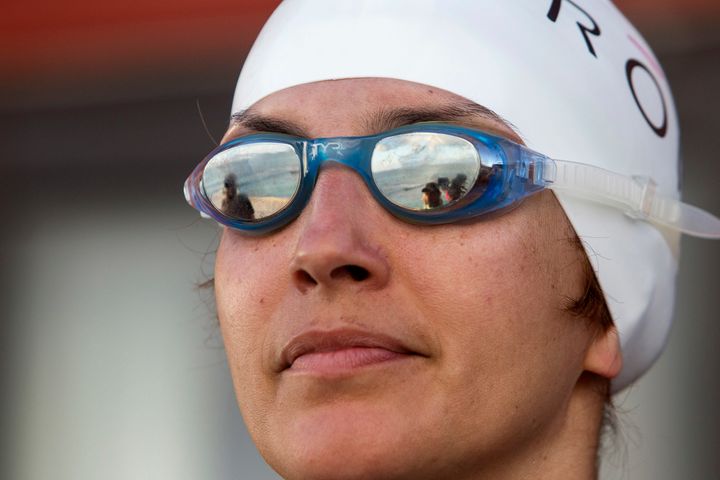This woman went from trafficking victim to triathlon victor.
When Norma Bastidas shattered the world record for longest triathlon in 2014, by completing a 3,762-mile race, she did it in the name of human trafficking victims. Now nonprofit iEmpathize is raising funds to make a documentary about her, to raise awareness of the issue of exploitation and to show people what survivors are capable of.
“I was a survivor of sexual violence and human trafficking,” Bastidas said in a video interview with the filmmakers. “I did a world record in honor of other survivors, to say: Look at us.”
Her story is a familiar one when it comes to human trafficking: Raised in a struggling family in Mexico, at 19 she was offered a modeling job in Japan, according to CNN. But Wwhen she arrived, she realized there was no job -- instead, her papers were taken away and she was sold to a wealthy man.
"I was drugged, beaten," Bastidas told the news outlet. "I went to the police and they did not do anything. They said, 'You were a bad girl. You work in a bar.'"
Today, some 2.4 million people are victims of trafficking every year. In many countries, sex trafficking victims are treated as criminals, arrested and jailed for sex work, rather than assisted.

Bastidas finally managed to escape her assailants with the help of a nearby convent, according to CNN, and she eventually moved to Canada.
Years later, after one of her children was diagnosed with cone-rod dystrophy, a blinding, incurable eye condition, she began running competitively, according to her website.
“As a single parent supporting myself and my two sons, [it was] an emotionally draining experience,” she wrote. “To relieve the stress, I began to run – and I never stopped!”
In July 2009, she became the fastest female in history to run seven of the planet’s most "unforgiving environments" on seven continents in seven months, according to her site. She ran in support of blind or visually impaired people.
And in 2014, she broke the Guinness World Record for longest triathlon -- but this time she ran for trafficking victims. She ran, swam and biked 3,762 miles, according to ESPN -- more than double the previous record of 1,578-miles.
Her course traced a known human trafficking route from Mexico to the U.S., according to ESPN, and she used the event to raise awareness and funds for trafficking victims.
"This is about helping teach everybody that nobody deserves this," she told the news outlet. "[Showing] who we really are but, more than anything, empowering survivors."

Now iEmpathize, a nonprofit working to end child exploitation, is crowdfunding to complete the documentary about her journey, "Be Relentless." Any funds raised will go toward filming a final interview with Bastidas and completing the editing -- and they’ve raised almost $15,000 so far.
The film will serve to educate people on child exploitation, but also to show other trafficking survivors that their experience doesn’t have to define them.
"Human trafficking is what happened to you, it's not who you are," Bastidas told CNN. "Every single time we doubt human trafficking victims have potential, we are quietly and ignorantly saying 'it's your fault.' And that's so wrong."
To help iEmpathize complete the documentary about Bastidas, you can donate here.
Related
- SEO Powered Content & PR Distribution. Get Amplified Today.
- PlatoData.Network Vertical Generative Ai. Empower Yourself. Access Here.
- PlatoAiStream. Web3 Intelligence. Knowledge Amplified. Access Here.
- PlatoESG. Carbon, CleanTech, Energy, Environment, Solar, Waste Management. Access Here.
- PlatoHealth. Biotech and Clinical Trials Intelligence. Access Here.
- Source: https://www.huffpost.com/entry/norma-bastidas-human-trafficking-triathlon-record_n_574df5a2e4b02912b24116be
- :is
- :not
- 000
- 1
- 10
- 11
- 19
- 2014
- 400
- 66
- 7
- 8
- 9
- a
- About
- Absolute
- According
- Advertisement
- After
- against
- almost
- also
- an
- and
- any
- anything
- ARE
- arrested
- arrived
- AS
- At
- awareness
- away
- Bad
- bar
- BE
- became
- before
- began
- blind
- Broke
- but
- by
- Campaign
- CAN
- Canada
- capable
- child
- Children
- CNN
- comes
- complete
- Completed
- completing
- component
- condition
- countries
- course
- credit
- Criminals
- Crowdfunding
- define
- deserves
- DID
- do
- documentary
- Doesn’t
- donate
- double
- doubt
- editing
- educate
- empowering
- end
- environments
- escape
- ESPN
- Ether (ETH)
- Event
- eventually
- Every
- everybody
- experience
- exploitation
- eye
- familiar
- family
- far
- fastest
- female
- Film
- filming
- filmmakers
- final
- Finally
- For
- from
- funds
- Girl
- Go
- guinness
- happened
- Have
- height
- help
- helping
- her
- here
- history
- honor
- horizon
- http
- HTTPS
- human
- i
- image
- in
- Indiegogo
- instead
- Interview
- issue
- IT
- jailed
- Japan
- Job
- journey
- July
- just
- known
- landscape
- later
- left
- LINK
- Look
- LOOKS
- make
- man
- managed
- many
- March
- March 1
- Mexico
- million
- modeling
- months
- more
- most
- moved
- my
- myself
- name
- never
- news
- no
- Nonprofit
- now
- of
- offered
- on
- ONE
- or
- Other
- outlet
- package
- papers
- part
- People
- plato
- Plato Data Intelligence
- PlatoData
- Police
- portrait
- position
- potential
- previous
- quietly
- Race
- raise
- raised
- raising
- rather
- Reacts
- realized
- really
- record
- relative
- relentless
- Reuters
- Route
- ruiz
- Run
- running
- s
- Said
- say
- saying
- serve
- seven
- Sex
- Sexual
- she
- show
- showing
- single
- site
- So
- so Far
- sold
- some
- Starting
- Story
- stress
- Struggling
- support
- Supporting
- survivor
- taken
- text
- than
- that
- The
- the world
- their
- Them
- There.
- they
- this
- time
- to
- told
- top
- toward
- trafficking
- treated
- true
- two
- u.s.
- UN
- URL
- us
- used
- Victim
- victims
- Video
- VIMEO
- visually
- was
- we
- wealthy
- Website
- went
- were
- What
- when
- WHO
- will
- with
- woman
- Work
- working
- world
- world’s
- Wrong
- year
- you
- Your
- zephyrnet




